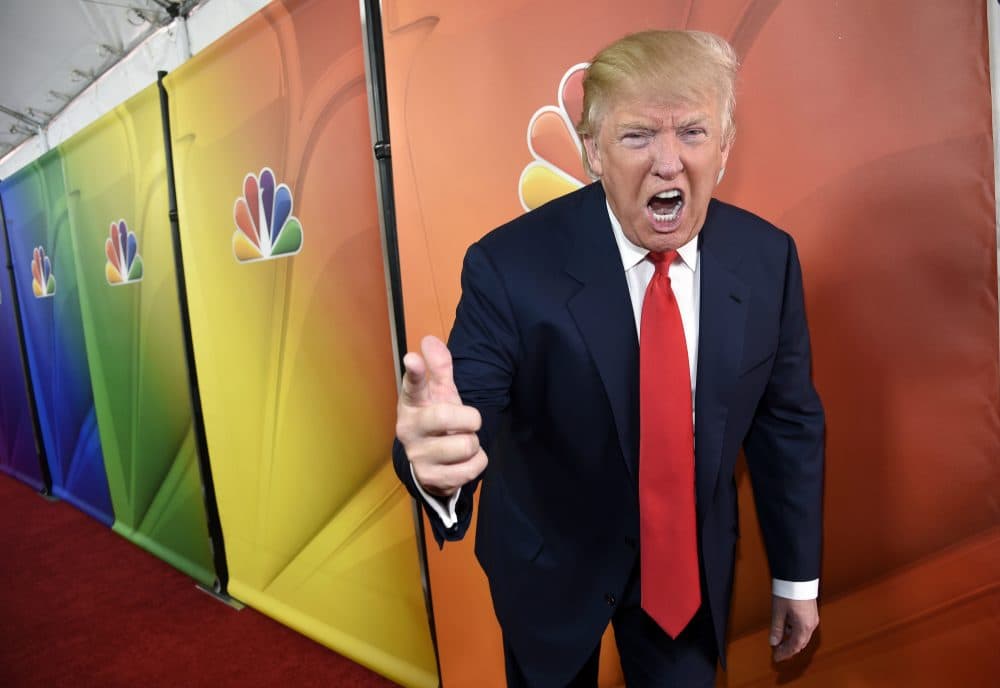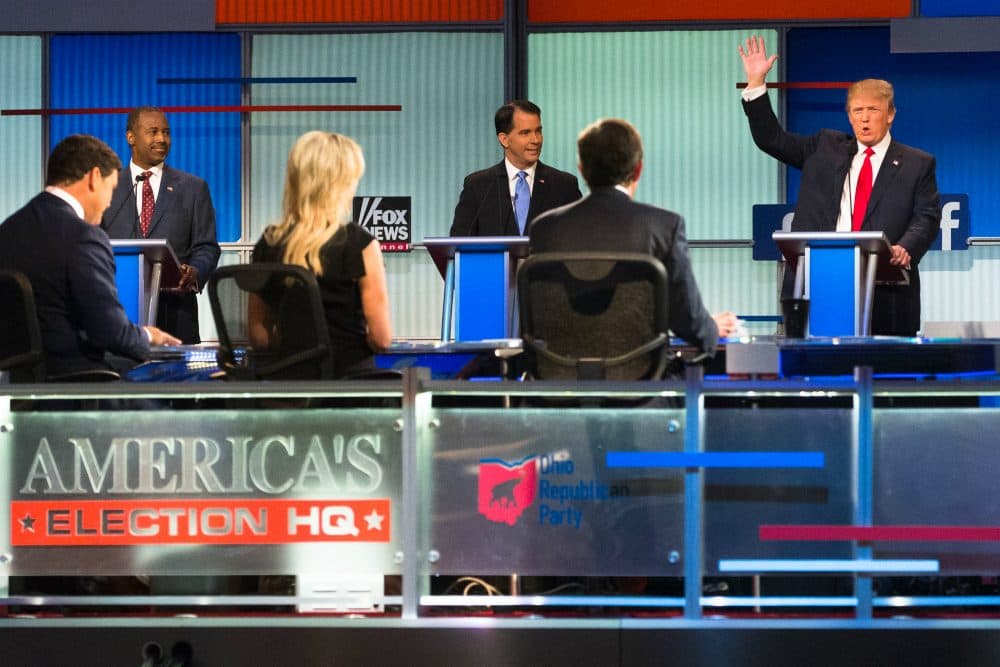Advertisement
When Celebrities Repackage Themselves As Politicians

Donald Trump dislikes a lot of people, it’s clear. But there’s no group he seems to hate more than political reporters — those ugly, sleazy losers who scrutinize his past and dwell on subjects he’d rather avoid.
Granted, it’s hard to find a presidential politician who truly loves the press. Sarah Palin sniped against the “lamestream media.” President Obama seems to prefer “Between Two Ferns” to the standard news conference. Hillary Clinton has a perpetually frosty relationship with reporters; if Trump weren’t in the race, we’d probably hear a lot more grousing about her.
But there’s a different quality to Trump’s war with the media, and it goes well beyond his willingness to hurl personal attacks. This isn’t a mutually assured push-pull battle between two powerful forces. It’s a fundamental misunderstanding of the terms of the relationship itself. Because while Trump is no stranger to media attention, this year, he has switched domains. What he knows, and knows how to manipulate, is the entertainment press.
As someone who has covered both presidential politics and entertainment, I can attest that some of the trappings are the same. Events are carefully choreographed, access is filtered through sometimes-haughty publicity teams, subjects are prepped with talking points.
This isn’t a mutually assured push-pull battle between two powerful forces. It’s a fundamental misunderstanding of the terms of the relationship itself.
The difference is the balance of power. Most politicians approach the political press with a grudging acceptance. They recognize the Fourth Estate’s role in democracy, the value in keeping elected leaders accountable. They need the media, not just for sheer exposure, but to build a conversation, make a case.
Celebrities have no such sense of accountability. And while they need the entertainment media at times — to abet the sale of movies, TV shows and clothing lines — they know that the media needs them more. So they can set the rules of access and engagement.
It’s no secret that celebrities are treated differently than the rest of us. When you interview stars, you see, up close, the weirdness of life atop the pedestal. Once, I watched a height-of-her-fame Britney Spears arrive at a Cape Cod summer camp with an entourage befitting a head of state: a motorcade, a team of security goons, a publicist toting an infinitesimal dog. I saw an emergency makeup team descend, like a pack of commandos, on Rebecca Romijn: One person applied gloss to her lips while another individually tousled strands of her hair. Over the phone, I heard a young publicist gush, “Are you ready for your 10 minutes with Susan Sarandon?” – suggesting that the next 600 seconds would soon become the highlight of my life.
Advertisement
I can’t recall which movie Sarandon was plugging at the time, but I remember that she was gracious. She was doing her job, and it was a kind of work, answering the same questions over and over again from a string of low-level reporters like me.
But like every celebrity, she operated beneath an umbrella of safety, knowing that no question would stray too far from the narrow subject at hand. These are the ground rules of entertainment reporting: In exchange for access to stardom, your purpose is largely to fawn — or, at least to abet a narrative, assisting in a marketing machine by burnishing the image of the star.

Sometimes, restrictions are stated explicitly: The last time Tom Cruise promoted a movie, reporters were told they couldn’t ask about his personal life or Scientology. But even without stated rules, the guardrails are there. Cross them and the interview will end — and access to stardom, the currency of the trade, will dry up. This is a bargain most reporters are loath to break. It’s what enabled the accusations against Bill Cosby to go unexamined for so long. Over the years, it also enabled Donald Trump.
Trump, to be sure, has never been a typical celebrity. While his marriages, divorces and TV successes have kept him in the entertainment pages, his business and legal dealings have gotten him plenty of negative press. But through it all, he behaved, and was largely treated, as an entertainer. The image to be burnished was his brashness, his coarseness, his self-aggrandizement, his vast ambition. So even his weird, uncouth statements worked in his favor: They made him ever so much more Trump.
He continued to play this game in the early months of the race, when the cable outlets, unsure of how to treat him but certain that his every utterance was ratings gold, gave him airtime whenever he wanted. It was a gift worth millions in free advertising, and it was available only to Trump.
But Trump was operating under celebrity journalism rules. Access was currency, so when he got mad at Fox News, the weapon he could yield was the withdrawal of his presence. And the consequences were real: When he skipped a Fox News debate, ratings plummeted. All the while, he brushed off negative stories and hand-wringing editorials as if they were snide comments on the back page of US Magazine. His feverish primary base didn’t care.
The irony of Trump’s celebrity approach — his haughty worldview, his use of Twitter to spout every waking thought — is that it makes access nearly irrelevant.
Trump has wielded access as a precision-guided weapon. He began with extreme restrictions on reporters’ movements, not just holding reporters in pens at rallies, but requiring them to get escorts to go to the bathroom. Then he started issuing bans on specific reporters and recalcitrant news outlets.
For a while, this was background buzz; the media was distracted by other candidates and their gaffes. But in the general election campaign, the dynamics have shifted. A focused and fully engaged political press is the opposite of the entertainment press: primed for watchdoggery, deeply competitive, committed to searching closets for skeletons and speeches for misstatements.
This scrutiny is tough for any big-league politician — five-star generals and business titans have crumpled in the heat of the arena. In “Primary Colors,” Joe Klein called the campaign press the “scorps,” short for “scorpions” — and there can be something disheartening about the pack reporting, the search for the day’s standard narrative, the antennae primed for the stumble.
But it is also a tool for testing a presidential candidate. And it’s a fairly perfect manifestation of democracy: the press as a living, breathing, stinging reminder that a politician answers to the people.
This is something Trump has yet to adjust to, and perhaps he never will. After all, he’s not "running" in the conventional sense. He’s appearing on his own terms, in unexpected places — confounding expectations, except for the expectation that he will be himself.
But the political press is also true to itself, and it won’t let up. The irony of Trump’s celebrity approach — his haughty worldview, his use of Twitter to spout every waking thought — is that it makes access nearly irrelevant. A press conference ban won’t stop political reporters from seeing Trump in action, or doing their jobs. If anything, they’ll just have more time to dig.
